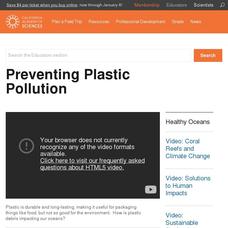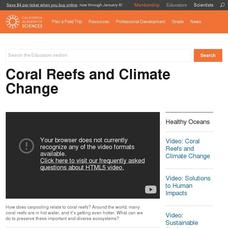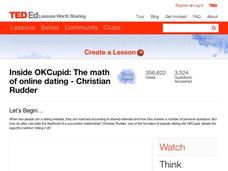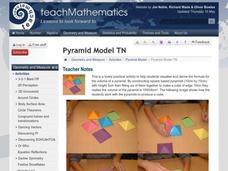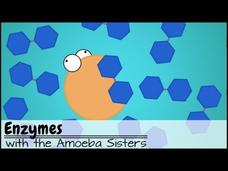California Academy of Science
Urban Farming
More than 20 million Americans lack access to grocery stores. The sixth lesson in the 13-part unit on Our Hungry Planet introduces the concept of food deserts and ideas to correct this lack of access. Discussion questions provide a...
California Academy of Science
What is the Environmental Impact of Feeding the World?
One in every seven people suffer from a lack of basic food. Our Hungry Planet introduces this complex issue in the second lesson of an interesting 13-part unit. It discusses the space needed to grow and raise food, the transportation of...
California Academy of Science
Nuclear Energy: Is Fission the Future?
Nuclear energy powers the Mars rovers as well as provides energy in more than 30 countries around the world. While some believe nuclear energy is the future of energy production, others worry about the risk factors and radioactive waste....
California Academy of Science
What's the Deal With Fossil Fuels?
Plastic bags, laptops, and even toothpaste all contain petroleum. A lesson explains how to define fossil fuels, including petroleum, and the many uses for fossil fuels in our everyday lives. It also details why new sources need to...
California Academy of Science
Renewable Energy: Clean Tech Solutions
Renewable energy originally found application more than 790,000 years ago. A relevant and engaging lesson explains some of the current options for renewable energy. Technology changes quickly and many different options provide hope for...
California Academy of Science
Renewable Energy: Powered by Poop
A single cow produces more than 100 pounds of manure every day. Meet a farmer using cow manure to provide energy to his farm, electric car, and the larger electric grid. He explains the process and benefits of the renewable energy source.
California Academy of Science
Preventing Plastic Pollution
While plastics don't biodegrade, they do photodegrade, creating issues in Earth's oceans. The final video in the Healthy Oceans series explains why plastic in oceans causes so many issues. the narrator explains the impact of plastic...
California Academy of Science
Sustainable Seafood
Memory, brain health, and seafood often go hand in hand, but is eating fish good for the planet? The third video in a four-part series on Health Oceans explains which fish consumers need to avoid and which are safe to consume without...
California Academy of Science
Solutions to Human Impacts
The phrase think globally, act locally inspires scholars to address pollution. After learning about invasive species, nutrient pollution, and dead zones, discussion questions help scholars link the concepts. They then apply knowledge of...
California Academy of Science
Coral Reefs and Climate Change
Coral reefs cover less than one percent of the ocean floor, yet more than 25 percent of marine life lives in coral reefs. A colorful, engaging video describes the health of coral reefs and why the formations matter. The first lesson in a...
Curated OER
Inside OKCupid: The Math of Online Dating
Capture the hearts of your young statisticians with this real-life example of using statistics in online dating. The use of average and geometric mean are discussed in the context of creating the algorithm used to connect people.
Khan Academy
More on Variables
Variables represent one of the most fundamental features in any programming language. The easy-to-follow explanation given in this video focuses on the difference between variables and values. Specifically, the author looks at how to use...
American Chemical Society
Can I Still Eat This?
The United States sends 133 billion pounds of edible food to landfills every year. A lesson from the ACS Reaction series discusses the chemical reactions that cause food to change over time. Some reactions make food taste different while...
Bill of Rights Institute
Dred Scott vs. Stanford
The United States was on the brink of a war within itself when the Dred Scott case came before the Supreme Court. Viewers examine the defining case that served as a ratuionale for slavery leading into the Civil War.
Bill of Rights Institute
Constitutional Principles: Consent of the Governed
A government of the people, by the people, and for the people! Invite your class to really analyze the concept of consent of the governed and why it is one of the foundational principles of the United States Constitution and of...
Jim Noble, Richard Wade & Oliver Bowles
Pyramid Model
Seeking to derive the formula for the volume of a square pyramid, geometry learners construct six square based pyramids that, when pieced together properly, form a cube. Two short videos demonstrate the relationship between pyramid and...
Teaching Channel
Using Expertise to Group Students
If you've been looking to increase the level of differentiation in your teaching, this video is a great place to start. A selection of teachers from Lincoln Middle School explain how they use their individual expertise to support...
Teaching Channel
Aligning Curriculum Within and Across Grades
You didn't learn this last year? Discover how the teachers at one school are working to never have to say this common phrase! Administrators and teachers discuss their process of curriculum alignment and mapping, clearly identifying...
Amoeba Sisters
Enzymes (Updated)
Enzymes really know how to keep things moving along! Introduce these powerful proteins through a short video from an extensive life science playlist. Viewers learn why enzymes are specific in their jobs, important enzymes in our bodies,...
National Constitution Center
Classroom Discussion Starter: Freedom of Expression
The Ku Klux Klan wants to hold a rally on the Antietem battlefield. Should the federal park permit the rally? Or does the First Amendment have limitations? Scholars ponder these questions and more using a discussion starter video and...
Other
Go for Broke National Education Center: Hanashi Oral History Program
The stories of Japanese-American soldiers' experiences up to and during World War II and on to today are chronicled on this site.
Khan Academy
Khan Academy: Basic Site Navigation
Basic site navigation is part of Khan for Educators, a free course for teachers to learn more about Khan Academy, the content and tools available for teachers and students, and best practices for implementing technology with students....
PBS
Pbs Learning Media: Common Sense Education: Identifying "Fake" News
This "5 Ways to Identify Fake News" video [1:09] will help students easily identify suspicious sites and information on the Web.
NOAA
Noaa: Estuary Education: China Camp State Park
California's China Camp State Park is an important environmental and historic site which has a natural watershed along the shores of San Francisco Bay. Features in the estuary include an extensive intertidal salt marsh, meadow, and oak...








